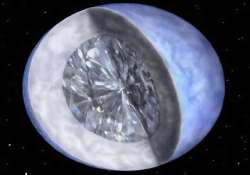"Like a Diamond in the space"
New Delhi: The largest diamond ever found is not on Earth, but faraway across the galaxy. Scientists at the National Radio Astronomy Observatory tracked down the very cold and dim star.It's so cold, its carbon

New Delhi: The largest diamond ever found is not on Earth, but faraway across the galaxy. Scientists at the National Radio Astronomy Observatory tracked down the very cold and dim star.
It's so cold, its carbon is crystallized, hence the giant space-diamond talk. It was first noticed when astronomers located its pulsar companion, the charmingly named PSR J2222-0137.
It's the burned out corpse of a star named BPM 37093 only about 50 lightyears away from Earth in the region of the sky we refer to as the constellation Centaurus.
The newly discovered cosmic diamond is a chunk of crystallized carbon 50 light-years from the Earth in the constellation Centaurus. (A light-year is the distance light travels in a year, or about 6 trillion miles.) It is 2,500 miles across and weighs 5 million trillion trillion pounds, which translates to approximately 10 billion trillion trillion carats, or a one followed by 34 zeros.
After it was discoverd in 2004, astronomers nicknamed the space diamond Lucy after the Beatles song Lucy In The Sky With Diamonds.
For more than four decades, astronomers have thought that the interiors of white dwarfs crystallized, but obtaining direct evidence became possible only recently.
“It's the mother of all diamonds!” says Metcalfe. “Some people refer to it as ‘Lucy' in a tribute to the Beatles song ‘Lucy In The Sky With Diamonds.'”
Lucy is not visible from Earth with the unaided eye. It must be viewed with a telescope and is best seen from Earth's Southern Hemisphere during March-June.
Lucy, also known as BPM 37093 and V*886 Cen, is the 886th variable star in the constellation Centaurus.
It's so cold, its carbon is crystallized, hence the giant space-diamond talk. It was first noticed when astronomers located its pulsar companion, the charmingly named PSR J2222-0137.
It's the burned out corpse of a star named BPM 37093 only about 50 lightyears away from Earth in the region of the sky we refer to as the constellation Centaurus.
The newly discovered cosmic diamond is a chunk of crystallized carbon 50 light-years from the Earth in the constellation Centaurus. (A light-year is the distance light travels in a year, or about 6 trillion miles.) It is 2,500 miles across and weighs 5 million trillion trillion pounds, which translates to approximately 10 billion trillion trillion carats, or a one followed by 34 zeros.
After it was discoverd in 2004, astronomers nicknamed the space diamond Lucy after the Beatles song Lucy In The Sky With Diamonds.
For more than four decades, astronomers have thought that the interiors of white dwarfs crystallized, but obtaining direct evidence became possible only recently.
“It's the mother of all diamonds!” says Metcalfe. “Some people refer to it as ‘Lucy' in a tribute to the Beatles song ‘Lucy In The Sky With Diamonds.'”
Lucy is not visible from Earth with the unaided eye. It must be viewed with a telescope and is best seen from Earth's Southern Hemisphere during March-June.
Lucy, also known as BPM 37093 and V*886 Cen, is the 886th variable star in the constellation Centaurus.